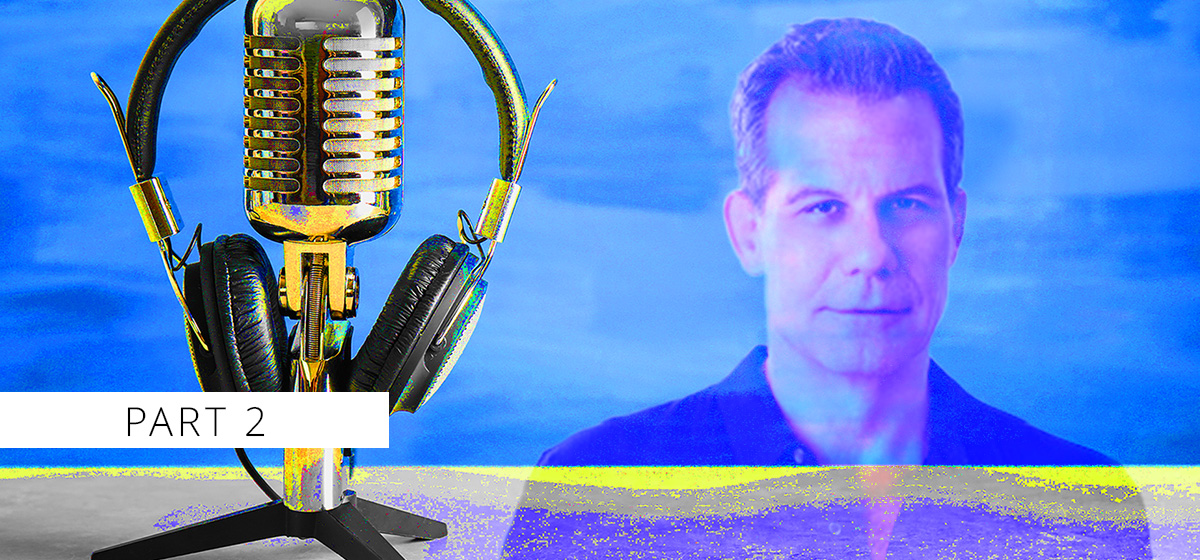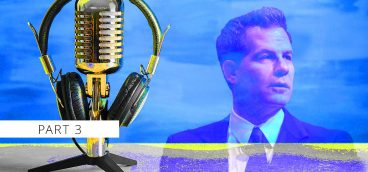Richard Florida’s Three Game Changers for the Post-COVID World

Donald Bonk interviews Richard Florida, influential professor, author and urban theorist, as part of the Pittsburgh Tomorrow podcast series. This is the second part of a three-part interview. The transcript is abridged and edited for clarity.
View the episode archive here. Read Richard Florida’s Creative Class bio here. Read his University of Toronto bio here.
“I think focusing really hard on making sure that Pittsburgh isn’t pulled apart—respect for difference—will be important. The fact that Pittsburgh is blue and red is important. But in Pittsburgh, that isn’t a pitched battle like it is in the country. People even in their same family have a Trump supporter and a Biden supporter.” —Richard Florida
Richard Florida’s final quote from episode 11 (Part 1)
Florida: I think Pittsburgh could be the best, the most livable, the most sustainable. And I would echo the most racially and economically inclusive. Mayor Peduto is an old friend of mine from my Pittsburgh days. He’s put an emphasis on inclusive innovation. I think this idea of a shared prosperity, harking back to the union movement, the steelworkers, to people who struggle, who literally fought pitched battles in the streets of Homestead along the Monongahela River. I think Pittsburgh should be the model of the best, the most equitable, the most inclusive, the healthiest, the safest and most resilient small city in the world.
Richard Florida episode 12 (Part 2)
Bonk: That’s extremely helpful, just tying that past history, because the union movement obviously shared wealth. Shared prosperity was Pittsburgh’s story through the late 1940s, 1950s and 1960s.
Florida: Think about also the devastating impact of the Spanish flu on Pittsburgh: The fact that people were annihilated in the factory and steel mill complexes, the fact that there wasn’t access to health care, and how that stimulated a movement in Pittsburgh to provide much better public health.
And then, that combined with the great floods and the air pollution, with the air pollution contributing to respiratory distress. This other movement after World War II, to kind of do the Renaissance, which wasn’t so much about changing the economy as it was about making Pittsburgh a cleaner and safer and better place to live.
If you take the union movement to give working people a better livelihood, and you combine that with the environmental movement and the movement for health, Pittsburgh has this kind of innovation in its very DNA. That’s the other thing I think Pittsburgh has going for it in the wake of this COVID crisis.
My view is that the central business district like you see in Manhattan—the financial district, the Mid-Town Headquarters District—is a relic of the past. It’s kind of the last echo of the industrial age. It’s what the factory complexes were to Pittsburgh and Detroit. There is no reason that hundreds of thousands and millions of people need to get in cars and trains and busses and subways and commute a half hour, 45 minutes, an hour, 90 minutes each way to go to work.
Pittsburgh is a city of neighborhoods. At its core, it’s a city of neighborhoods. What urbanists are talking about today is that the COVID crisis creates the ability to rebalance metropolitan regions around a set of hubs and spokes. Of course, there’ll be a midtown and a financial district. There’ll be a downtown Pittsburgh.
But you can imagine—there already is—out near the universities, out in some of the northern, southern and western suburbs, developing these spokes, these neighborhoods where people can work, live and play and spend a lot more time with their family. Pittsburgh is perfectly laid out to do this because it is a city like Toronto, a city of neighborhoods. It isn’t just a city built around one center core, although it’s center core, of course, is spectacular. It’s a city built around numerous spectacular neighborhoods with little centers of their own. In becoming this new kind of city region, Pittsburgh can build itself around its great history of neighborhoods as a safe, inclusive and resilient place with around 15 and 20 minute neighborhoods spread all across the region.
Bonk: You’ve listed a number of ideas in terms of equity, innovation and the green movement. The publisher is interested in this moonshot notion. If you had one big idea that Pittsburgh might think about adopting, what would it be? Do you think there’s one singular idea among these ideas that would be transformative of Pittsburgh’s narrative?
Florida: Yeah, I do. Pittsburgh should put together every single philanthropic dollar it can. We can go down the list of foundations and the new wealth that’s been created in Pittsburgh, not just of Pittsburghers in Pittsburgh, but people from Pittsburgh who made wealth outside of Pittsburgh. Put together the biggest pot of money—Tepper, Cuban, Heinz, Mellon, Benedum, whatever—to attract the 100 best and brightest superstar geniuses in the world, from computer science and artificial intelligence to arts and culture.
One of the things the COVID crisis has done is make people feel unmoored. For the first time in their lives, people are saying, “How do I want to live? I want to spend more time with my family. I don’t want to go back to the grind. I don’t want to get on a plane. I don’t want to go to the office every day. I’m working from home. I’m spending time with my wife and kids. Spending more time with my friends. I’m living in my neighborhood. I’m getting healthier. I’m riding my bike. I’m walking.”
If Pittsburgh said we want to attract 100 MacArthur Genius Awards—which is not a MacArthur Genius Award that says, “Stay where you are”—it would say, “Come to Pittsburgh and be part of this cohort of 100 of these unbelievably smart people from across disciplines.”
And use this to undergird Pittsburgh and Carnegie Mellon. Carnegie Mellon is the place that’s still closest to my heart. I think, pound for pound, Carnegie Mellon University is the greatest university in the world. Bar none. It may not be as big as MIT, may not be as big as Stanford, but pound for pound, given what it does, because it doesn’t have this grandiosity. It has a humility and the people there are just incredible.
I don’t know everybody in my department in the Rotman school (University of Toronto), it’s so big. Ninety five thousand students in the University of Toronto. I knew almost every faculty member at Carnegie Mellon. I had a joint appointment in computer science and software engineering because I was working with people there.
Anyway, make Pittsburgh the greatest center of artificial intelligence and computer-related, software-related urban technology in the world. So one genius award each for 100 of the best and brightest, but a real focus on artificial intelligence, particularly as it applies to smart cities.
This area of urban tech—mobility, surveillance, urban automation, delivery, we can go down to list, micro-mobility—is big. This is the biggest sector of high technology since software.
Pittsburgh is a laboratory. It has the scale to try it out. It has Carnegie Mellon. I would say, overall, focus on these 100 geniuses, but make a real deep dive move now into making Pittsburgh the center of artificial intelligence, computer-related innovation in cities and smart cities of urban technology. Those two things are moonshots that will pay off.
I remember when Astro Teller (CEO of Google X) was at Carnegie Mellon and he came up with this company called Body Media, which was one of the first to put a sensor on your arm—I have a fit bit on my arm now. He was the first to do this kind of thing. All of that sensor technology in your house and in the airport, temperature checks, health checks, we’re going to have to outfit elevators and buildings so that they’re healthier and safer: That stuff comes out of about four universities in the world, of which Carnegie Mellon is one.
So that’s the moonshot. The Center for Urban Innovation, Urban Tech and the 100 best and brightest in the world come to Pittsburgh with their research financed. Boy, it would be something that would position Pittsburgh for success for the next hundred years.
Bonk: As you said, the human scale that exists allows people literally to have a cup of coffee in a way, in Pittsburgh, among those hundred geniuses or other faculty members at CMU, that might not exist at a massive university.
Florida: Yeah. One other thing, Donald, that we always talked about, Herb Simon (1978 Nobel Prize winning economist and a Turing Award winner, computer science’s highest honor) always mentioned and I talked to my colleagues about when I lived in Pittsburgh: My house or apartment kept getting closer to the university such that when I left, I lived on Devonshire Road across the parking lot from the Heinz School, renting a house that the university had acquired.
Now, why is that? In New York City, Toronto, Los Angeles or Boston, there are a lot of distractions. In Pittsburgh, there are fewer. I’m not saying that’s good or bad, but you gravitate to where the energy is. Where’s the energy in Pittsburgh? On the Carnegie Mellon campus.
I probably would have been living in my office had I stayed another five years. The scale of the city is small. Many people live close by. Most of us come to the office when we lived in Pittsburgh. No one ever goes to their office in New York City because it’s hard to get to, it’s far, and there’s a lot of distractions. But in Pittsburgh, you gravitate to your colleagues and your students into the on-campus life.
That’s another big advantage to the area surrounding Carnegie Mellon and the University of Pittsburgh—it’s almost like an extended campus, a collegial campus. That’s a big deal. More people are looking for that now. More people are saying, “I don’t want to get on a plane. I don’t want to do all this other stuff. I want to do really interesting work and be close to my family and friends.” And I think Pittsburgh has that to offer.
Smart people have always loved Pittsburgh. Pittsburgh has smart and innovative in its DNA. Pittsburgh has always respected intelligence. It’s not like so much of the rest of America is, so captivated by celebrity culture.
I’ll give you a funny story. We spend the winter in Miami Beach and, you know, we like the city and want to help the mayor. And you see what’s happening with the COVID crisis there. It ends up that my kids, even though I’m Catholic and my kids and my wife are Catholic, my kids in Miami are in Jewish preschool. In our little Jewish preschool are DJ Khalid’s kids. DJ Khalid is Palestinian. It’s a very secular Jewish preschool.
Anyway, so, the mayor is trying to get it together. COVID is spiking. My wife says, “I’ll talk to Khalid and have him do a PSA (Public Service Announcement) for wearing a mask.”
The only person the folks in Miami would listen to is DJ Khalid. Do you see what I’m saying? They wouldn’t know what to do with a professor like me if I said, “Wear a mask.” They would say, “Who’s that guy?” But in Pittsburgh, there is a respect for intelligence. If you’re at Carnegie Mellon, you have status in the community the way you don’t have even if you’re at MIT in Boston; you have some. So there is a respect for learning, for research, for intelligence in Pittsburgh.
In that way, it’s a magnet because people say, “Oh, I can have support from my research, but people think what I’m doing is actually good. If I work at UPMC and I’m a transplant surgeon or working at tissue engineering, people think I’m actually contributing to the society in a meaningful way.”
So I think it’s both the fact that we have magnets for talent and that there’s tremendous respect for that talent in the environment that’s very unique in the America of celebrity culture today. Culture worships celebrities and rich people. Pittsburgh is much like, I hate to say, going back in time. It’s like being part of the fabric of what America was and a lot of things we lost. Intellectuals and researchers really, really like that climate.
It’s really interesting that when I look at the United States from the vantage point of Toronto, I would say our national politics is in deep, deep trouble. We are so darn polarized. I mean, look, Joe Biden will get elected. It would be way better. The country will pull together. He will actually put some Republicans in his administration. I think this (time, now) is the low point.
But when I look at what’s great about America, it’s the Pittsburghs and the Philadelphias and even Newark, my hometown and Bentonville, Arkansas, where I’m doing work, and Tulsa, Oklahoma, and Omaha, Nebraska. It’s this up-from-the bottom, public-private partnership anchored by universities like Carnegie Mellon, Penn, Drexel, or NYU—I could go down the list—Rutgers, Newark and NJIT in New Jersey, that are putting together these redevelopment efforts and now focusing on resiliency and inclusivity. It is this up from the bottom thing.
I think one of the big trends we have to change in the wake of this COVID crisis is don’t strengthen the federal government. The last thing we need to do is give our federal government more power. What we need to do is give the Pittsburghs of the world the power they need to grow.
Maybe Pittsburgh will never be the trendiest place for young people. Maybe young people will always go to the big, big cities, especially in their 20s and early 30s before they want to have a family.
But then when you have kids, you say, “Oh, it’s hard to live here. The schools aren’t very good. I’ve got to commute. I’ve got to try to find a public school. I got to commute them a half an hour, an hour to a private school. I don’t want to put them around all elite rich kids. I’d rather have them in a good public school or in a neighborhood school.”
Pittsburgh has an environment of affordability, cohesive neighborhoods and wonderful housing stock. There are a few places like that in the United States, but it’s not an infinite list. Going back to the COVID crisis: When people become unmoored, they say, “I love New York. I love San Francisco. But I have two or three kids now and it’s getting less affordable. Do I really want to go to the suburb, or can I remote work from Pittsburgh, Nashville or Indianapolis?”
Now, it might not be that everybody ends up in Pittsburgh, but everybody has a friend who said that they liked Pittsburgh. Nashville had this vibe happening five or six years ago. Pittsburgh’s now there.
What I would say to Pittsburgh is to watch out for the new urban crisis. Watch out for the crisis of success. If you said to people in Austin 20 years ago that Austin would become unaffordable, they would have looked at you like you’re from the moon. If you said Nashville would become unaffordable, people would just say you’re an insane person. But once you get this dynamic, it gets a hold of you. Denver is in the throes of it now.
The other thing I would say to Pittsburgh is to be careful, because everything that you’ve done right, could become, paradoxically, a challenge for you or a part of a new urban crisis that sets up the trap of success.
Bonk: Just a sidebar here quickly before we get to the last question. I interviewed two people recently. One is a Wharton grad who has a startup named Qlicket (www.qlicket.com). His name is Vivek Kumar. He’s 35. He has his company in Pittsburgh, but he also has distributed teams in New Delhi and San Francisco. What he does is arbitrage Pittsburgh. He lives in Pittsburgh, but he has a room in Silicon Valley, so he flies there, stays in his little room, and then flies back to Pittsburgh when he needs to. So it’s not necessarily staying in one place or the other, but Pittsburgh is a home base.
Florida: I think you’re exactly right. I think this idea of the multi-locational household is going to become more and more. I’ve heard this a lot about San Francisco, but I’ve also heard it increasingly about New York.
San Francisco and New York are simply too expensive to have a lot of space. It’s really hard to have the space you need to have a home office and have kids. So what you do is rent or buy a studio, which is still more expensive than a house in Pittsburgh. Now, some people in San Francisco are going to the rural areas outside of San Francisco. Some people in New York are going to the Hudson Valley, but others are saying, “The heck with that. I would much prefer Pittsburgh.”
My good friends at the Kaiser Family Foundation in Tulsa have created this program called Tulsa Remote, which an attempt to create a community of remote workers. There are people from New York, San Francisco, L.A., Chicago and Atlanta. I could go down the list of people that said, “I would rather live in Tulsa.”
I think I’ll always have to be connected to New York, Washington, D.C. or somewhere. But you can live in one place and connect to the hub centers. And Pittsburgh is one.
Look, when people talk about the rise of the rest, they make a mistake when they talk about 300 places. When we really drill down into the rise of the rest, you’re talking about a dozen or two dozen places. And Pittsburgh is on that list. There is a very short list of places that can be hub and spoke connections, and Pittsburgh is surely one of them.
Bonk: So, the analogy is the hub and spoke in the Pittsburgh metro area—neighborhoods connecting to the smart centers like Oakland—is the same hub and spoke metaphor for the nation using Pittsburgh.
Florida: Yeah. I forgot my one other moonshot idea. I had another one that I got so excited about, which goes back to days in Pittsburgh talking to folks like Tim McNulty, who’s still at Carnegie Mellon, and Don Smith at the Regional Industrial Development Corporation (RIDC).
We talked about how you could make Pittsburgh more of a hub. With the Biden administration likely to come on stream and with major infrastructure spending, part of the ongoing stimulus would be high speed rail.
If we were to undertake a high speed rail initiative in the United States, we could connect what John Gottman, the great economic geographer who invented the idea of megalopolis called the Chi-Pitts Mega Region—high speed rail going from Pittsburgh, west to Detroit and Chicago and east to Washington, D.C. and New York, or connecting in through Washington, D.C. And maybe someday to Toronto; that’s more of a pipe dream. But think about an East-West Coast connection where you would have high speed rail that would reduce the rail commute substantially.
That’s the game changer, the way to make Pittsburgh really the core spoke in a multi-hub spoke system. So that would be my third moonshot: 1. A talent genius grant to bring them to Pittsburgh (for example, the top 100 in AI, Computer Software, Robotics, Urban Smart-Tech, Arts & Culture) 2. Make Pittsburgh the AI-urban tech capital of the world. 3. Connect the damn place through high-speed rail, because the Biden administration is going to have to do it.
Bonk: Right, so, create the physical equivalent of the virtual infrastructure that we already have in place. That’s really tremendous and I appreciate that deep thought on that level.
Lastly, look at 2050, three decades in the future. 1990 is as far away as 2050. If you’re in the Urban Redevelopment Authority, the mayor’s office or the county executive’s office in Pittsburgh, are there three more Pittsburgh-centric, granular things that you think Pittsburgh could take on as project that would make an impactful difference?
Florida: In 2050, I would be 93. I don’t think I’ll be alive. My kids are going to be in their mid-30s. I want them to live in a great world. That’s what I want more than anything—my two girls to live in a fantastic world. That’s something I’m worried about.
I would say Pittsburgh needs to really double down on social cohesion. It’s a hard thing. It’s not like, you know, create an incubator or develop an industrial incentive package. One of the things that distinguishes Pittsburgh from the rest of America, which I like about Toronto and why my girls have dual citizenship, is it’s very cohesive and you can feel it pulling together in a crisis.
We set up our front porch here. People walk by and have a glass of wine and talk in the evening. That’s a Pittsburgh thing. I think focusing really hard on making sure that Pittsburgh isn’t pulled apart—respect for difference—will be important. The fact that Pittsburgh is blue and red is important. But in Pittsburgh, that isn’t a pitched battle like it is in the country. People even in their same family have a Trump supporter and a Biden supporter.







